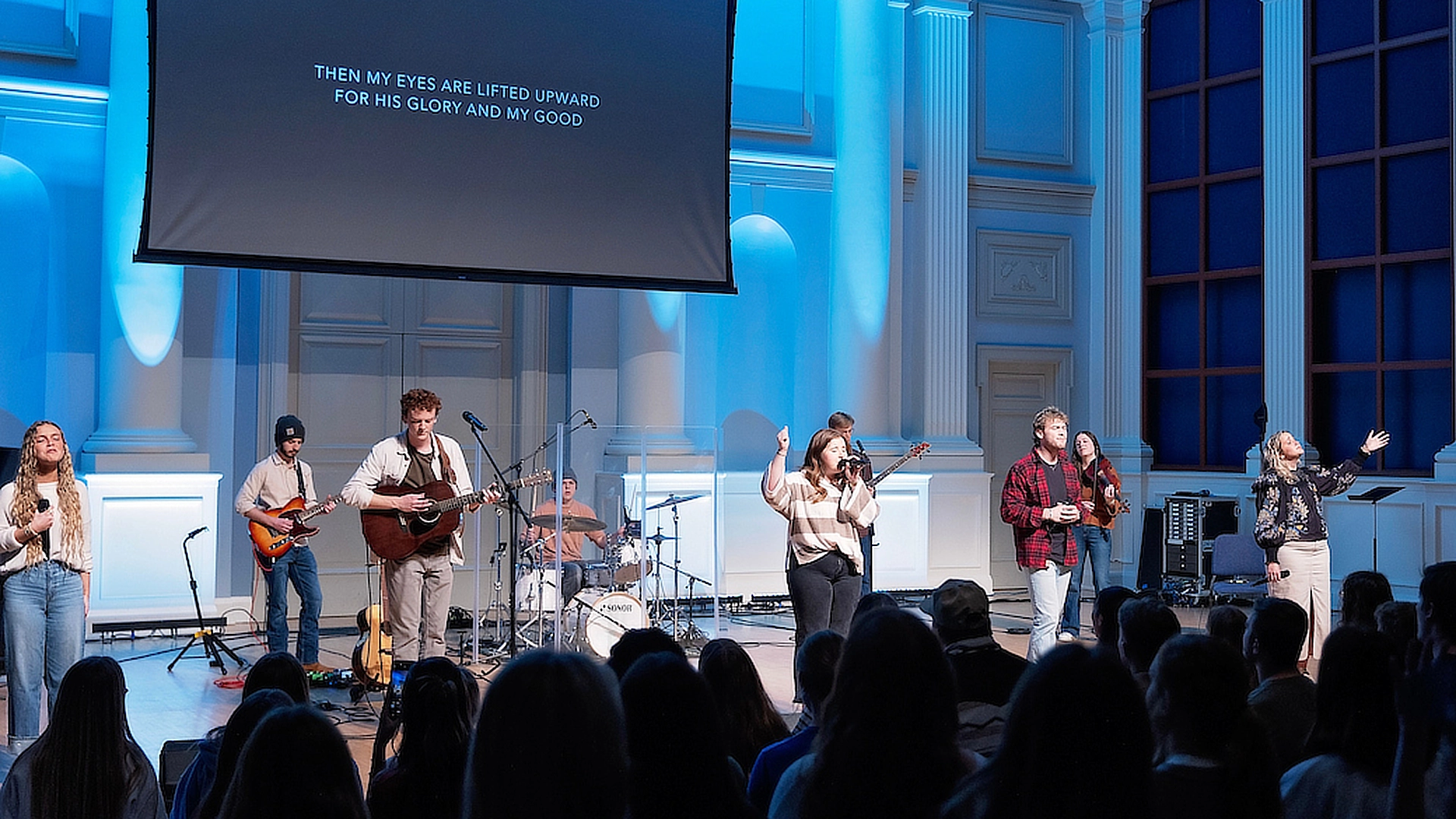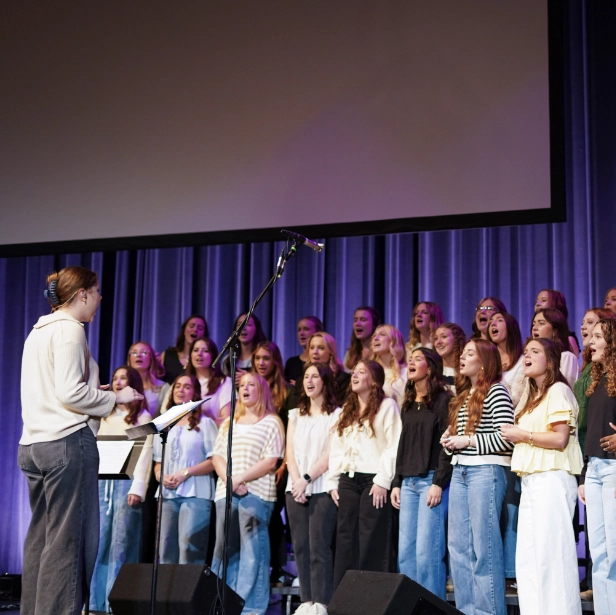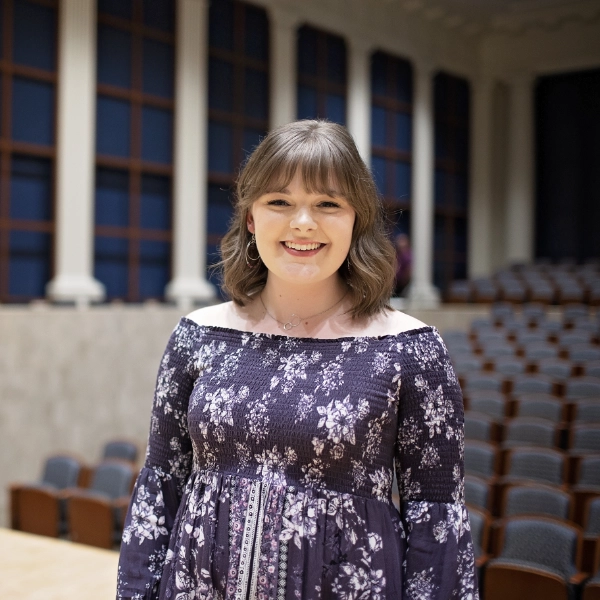Bachelor’s in Music and Worship | Samford University

Is This Program for Me?
Shape the Future of Worship Leadership
Samford’s Music and Worship degree equips you with the skills and experience needed to inspire and serve in roles like worship pastor, music minister or church musician.
Blend music, leadership, and ministry training with real-world worship experience and ensembles like the Samford Worship Collective. Through hands-on experience and a culminating ministry internship, you'll graduate ready to lead worship, inspire congregations or continue your journey in graduate school.
What Will I Learn?

Answering the Call
Discover and articulate your God-given calling to pastoral music and worship ministry.
Musical Skills
Develop your musical abilities to help lead a congregation in worship through music.
Biblical Thinking
Learn to shape worship using biblical, theological, philosophical and historical principles.
Discernment in Worship
Develop critical thinking skills to create meaningful and thoughtful worship experiences.
Worship Ministry Design
Gain the tools to design, plan, and lead effective music and worship ministries.
Engaging All Generations
Learn strategies to lead worship ministries that connect with people of all ages.
Tech & Production
Get hands-on experience with the technology and creative elements that make worship come alive.
Key Skills
- Musical Proficiency
- Song Selection
- Creative Worship Design
- Team Leadership
- Worship Media & Technology
- Theology of Worship
- Public Speaking & Prayer
- Digital Communication
- Pastoral Care
- Collaboration
- Event Coordination
- Emotional Intelligence

“Samford’s faculty are not only outstanding musicians, scholars and educators, but they are also dedicated to helping you succeed and genuinely interested in you.
“Through practical experience, this program allows you to attain an excellent and thorough musical education while giving you the freedom to pursue whatever genre of worship to which God calls you. Exposure to different forms of music and worship practices will equip you for excellence in the future.”
—Katie Schansberg '25
What Makes Us Different?
Deep Connections & Broad Perspectives
Practical Experience & Real-World Preparation
Career Preparation
Worship Leadership & Ministry
- Worship Pastor/Director
- Music Director
- Creative Arts Director
- Youth/Children’s Worship Leader
- Conference/Retreat Worship Leader
- Church Plant Worship Leader
- Missionary Worship Leader
- Worship Consultant
- Nonprofit Ministry Worker
- Christian Event Organizer
Music Performance & Production
- Recording Artist
- Church Musician
- Worship Producer
- Online Worship Coordinator
Education
- Private Music Instructor
- Music or Worship Ministry Educator
- Graduate Music Study
- Seminary/Theological Study
Ministry Connections Network
The Ministry Connections Network connects students with professional church and ministry leaders in worship, music, and the arts, further enriching their educational experience and preparing them for successful careers.
Admission and Scholarship
Appointments for auditions and placement examinations are scheduled upon receipt of the School of the Arts application materials. Students are notified by mail of the results of the auditions and are admitted for registration only if they have acceptance notices sent by the dean of the School of the Arts. Transfer students must audition in the principal performance area(s) and take a music theory and piano placement examination to determine both acceptance and transfer of credit. Transfer of credit for other music courses is determined by either placement examinations or review of the student’s previous work in an equivalent course.
Instrumental Concentration
Admission to the Division of Music and consideration for School of the Arts Scholarship requires an application and acceptance to the University through the following:
- Common Application
- Division of Music/School of the Arts application
- Audition/interview in principle area (see details below)
- Interview with worship faculty
- Music theory placement exam
- Piano placement exam (non-keyboard majors)
Students auditioning for the Instrumental concentration should prepare the following pieces:
Guitar (acoustic)
- Two solo pieces from contrasting style periods
- Both pieces should demonstrate strumming and picking techniques Major Segovia scales
- The applicant may choose to offer major Segovia scales, but they are not required
- Auditions should be played on a classical or acoustic guitar.
- Bring 3 copies of your sheet music for faculty.
Brass (euphonium, horn, trombone, trumpet, tuba)
- 2 pieces
- Pieces should be solo music such as an etude, sonata, or movement from a concerto
- Two contrasting style periods or tempi must be represented
- Bring 3 copies of your sheet music for faculty.
- Perform your audition pieces. We prefer no accompaniment with your audition.
Strings (cello, string bass, violin, viola)
- One piece of solo music such as an etude, sonata, or movement from a concerto
- One contrasting piece of solos music such an etude, sonata, or movement from a concerto
- Bring 3 copies of your sheet music for faculty.
- Perform your audition pieces. We prefer no accompaniment with your audition.
Percussion
- 2 pieces:
- One selection for snare drum
- One selection for mallets
- If you have 4-mallet experience, we recommend a selection demonstrating your ability. 4-mallet technique is not required.
- An optional third selection for timpani or drum set is encouraged but not required
- Bring 3 copies of your sheet music for faculty.
Woodwinds (bassoon, clarinet, flute, oboe)
- 2 pieces
- Pieces should be solo music such as an etude, sonata, or movement from a concerto
- Two contrasting style periods or tempi must be represented
- Bring 3 copies of your sheet music for faculty.
- Perform your audition pieces. We prefer no accompaniment with your audition.
Keyboard Concentration
Admission to the Division of Music and consideration for School of the Arts Scholarship requires an application and acceptance to the University through the following:
- Common Application
- Division of Music/School of the Arts application
- Audition/interview in principle area (see details below)
- Interview with worship faculty
- Music theory placement exam
Students auditioning for the Keyboard concentration should prepare the following pieces:
Piano
- 3 pieces
- At least two contrasting style periods must be represented
- Two pieces must be from standard classical repertoire
- All pieces must be performed from memory
Organ
- 4 pieces
- All pieces must be performed from memory
- Two other works in contrasting style from between the nineteenth through twenty-first centuries
- One traditional hymn with introduction and no less than three verses
- The hymn must be performed with music. All other works may be performed by memory or with music.
Vocal Concentration
Admission to the Division of Music and consideration for School of the Arts Scholarship requires an application and acceptance to the University through the following:
- Common Application
- Division of Music/School of the Arts application
- Audition/interview in principle area (see details below)
- Interview with worship faculty
- Music theory placement exam
- Piano placement exam (non-keyboard majors)
Students auditioning for the Vocal concentration should prepare the following pieces:
Voice
- Two pieces
- One English art song
- One art song in a foreign language, preferably Italian
Audition pieces must be performed from memory and with piano accompaniment. Be prepared for a vocal and musical assessment with tonal memory exercises, sight-reading, and vocal range check.
Application Information
Freshman applications for next fall are open.Freshman Early Action applications close November 1st.The freshman first scholarship deadline is December 1st.Transfer applications for the spring semester close Dec. 15.Freshman FAFSA priority and scholarship deadlines are Feb. 15.Decision day is coming! Freshman applications for fall enrollment close May 1st.Transfer applications for fall enrollment close July 1st.Freshman applications for fall enrollment are closed. Applications for next year open August 1st.Transfer applications for fall enrollment are closed. Applications for next year open September 1st.
Cookie Preferences | Privacy Policy | Software Plugins
Microsoft Excel®
Microsoft Power Point®
Microsoft Word®
Adobe Portable Document Format






